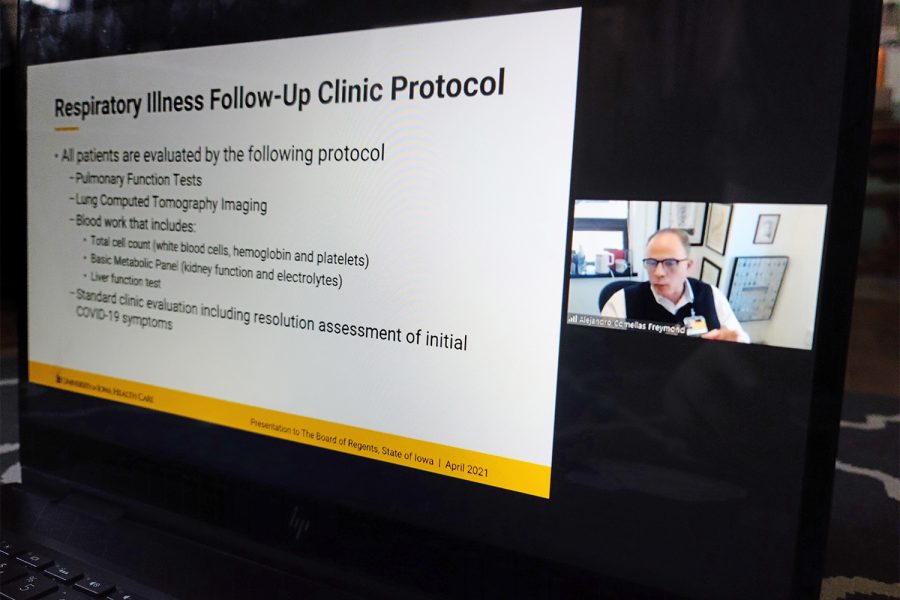University of Iowa Hospitals and Clinics reports near-record patient volumes
The state’s only research hospital is seeking to manage higher expenses during the pandemic.
Alejandro Comellas is seen giving a UIHC presentation during the Iowa Board of Regents meeting on Wednesday, April 14, 2021. (Brianna Brown/The Daily Iowan)
April 14, 2021
Suresh Gunasekaran, University of Iowa Hospitals and Clinics CEO of University of Iowa Health Care told the state Board of Regents on Wednesday that if it weren’t for the mandatory two-month shutdown because of COVID-19 in 2020, UIHC would have set all-time records for patient volumes in the hospital.
Treating patients from all 99 counties in the state in 2020, Gunasekaran told the regents that UIHC has tried to maintain some level of expense control, while also dealing with unprecedented volumes during the pandemic.
“When only a certain portion of services are overrun, it is really hard for us to manage it financially,” he told the regents.
UIHC Chief Financial Officer Brad Haws said UIHC’s operating margin has stayed consistent throughout fiscal 2021 at 4.1 percent, compared to the national average of 1.1 percent.
RELATED: Regents approve three University of Iowa refunding bonds, saving millions
UIHC received support from external funding, such as the CARES Act passed by Congress in 2020, which will not continue after the COVID-19 pandemic.
Haws told the regents that expenses at UIHC this year are higher than what was expected in the fiscal 2021 budget and are growing faster than the hospital’s revenue.
UIHC has relied on external staffing to take on new tasks during the pandemic, he said.
As previously reported by The Daily Iowan, UIHC hired more temporary nurses to relieve staffing stress for COVID-19-related clinics.
UIHC workers were required to either take furloughs or give up paid vacation time during the pandemic in an effort for the hospital to cut down on costs incurred from COVID-19.
Gunasekaran said UIHC anticipates seeing a significant demand across UIHC in 2021 as total clinic visit volume has increased by 17 percent over the past five years.
Long-Term Symptoms in 30 Percent of COVID-19 Patients
Since the summer of 2020, the UIHC has been the home of the Respiratory Illness Follow-up Clinic to evaluate COVID-19 survivors’ long-term symptoms, Alejandro Comellas, Director of the ICTS Clinical Research Unit at the University of Iowa told the regents.
“The long-term consequences of COVID-19 is something that a lot of people are right now realizing that it’s a major problem that they’re going to be facing years to come,” Comellas said.
Long-term symptoms from COVID-19 are now considered a syndrome called Post-Acute Sequelae SARS-CoV-2 Infection.
Comellas told the regents that COVID-19 reports have shown that 30 percent of COVID-19 patients, independent of the severity, have a post-acute infection.
“We have seen more than 200 patients, and we already have close to 250. There are 100 new ones coming up in the next few months,” Cormellas said.
Cormellas said 75 percent of post-COVID-19 patients have shortness of breath, half have fatigue, one third of patients have a chronic cough. The clinic has seen patients who develop neurological problems with memory, concentration, mood changes with worsening anxiety and depression, he told the regents.
UIHC continues to meet the demands of the community by keeping the clinic open, Cormellas said.
“We engage with the community to understand better their suffering,” Cormellas said. “We have community engagement sessions in which we’re learning really what they have to go through on a daily basis.”






